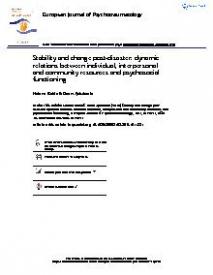Stability and change post-disaster : dynamic relations between individual, interpersonal and community resources and psychosocial functioning
Conservation of Resources (COR) theory defines psychological stress as the result of a threat or actual loss of resources, or lack of resource gain. Given that disasters present a significant risk for resource loss, the aim of this study was to examine the dynamic relationship between the change in different levels of resources and the change in psychosocial functioning. A random sample of N= 224 community members from a municipality affected by the 2014 Southeast Europe floods were interviewed one and a half and two and a half years post-disaster, using the Connor–Davidson Resilience Scale 10-item version, the Multidimensional Scale of Perceived Social Support, the Community Resources Scale – the Social Capital and Community Engagement subscale, the PTSD Checklist for DSM-5, the Center for Epidemiological Studies Depression Scale-Revised and the Satisfaction with Life Scale. The results of the Latent Difference Scores modelling indicate that the increase in resources was related to a decline in post-traumatic stress (PTS) and depression symptoms and increase in life satisfaction, and vice versa. Interpersonal resources were significantly related to all measured psychosocial outcomes, individual resources to PTS and life satisfaction and community resources to life satisfaction only. The mean level of resources remained the same, but a significant inter-individual variability in resource change was found: for some, they have increased, and for some decreased over time. Furthermore, resources changed independently: an increase in one was not related to an increase in another. These findings highlight the importance of resource gain and loss for psychosocial outcomes and call for targeted post-disaster interventions that can, by increasing the levels of resources in affected communities, decrease the levels of symptoms and increase wellbeing.
Geachte bezoeker,
De informatie die u nu opvraagt, kan door psychotraumanet niet aan u worden getoond. Dit kan verschillende redenen hebben,
waarvan (bescherming van het) auteursrecht de meeste voorkomende is. Wanneer het mogelijk is om u door te verwijzen naar de bron
van deze informatie, dan ziet u hier onder een link naar die plek.
Als er geen link staat, kunt u contact opnemen met de bibliotheek,
die u verder op weg kan helpen.
Met vriendelijke groet,
Het psychotraumanet-team.
In: European Journal of Psychotraumatology ISSN: 2000-8198 (Print) 2000-8066 (Online) | 10 | 1 | mei | 1614821
https://www.ncbi.nlm.nih.gov/pmc/articles/PMC6541896/


